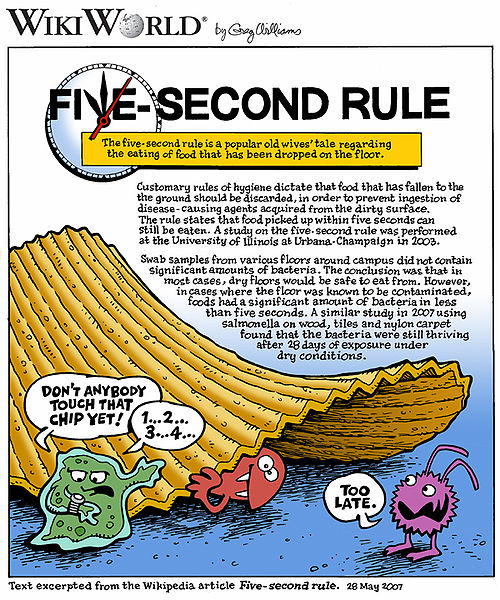 |
| By Greg Williams for Wikipedia |
This was reported recently in the Daily Mail :
To many of us, it is second nature to apply the age-old pseudo-scientific 'three second rule' on such occasions, telling ourselves we're safe if the food hit the floor only momentarily.
The idea that food is not contaminated if it is retrieved quickly has been believed for many years - but there has not been extensive proof that this is the case.Now though, the doubt is out as scientists have finally investigated the theory to discover whether the rule is fact or fiction.
Five food items were tested by Manchester Metropolitan University (MMU) to see whether the three-second rule could be trusted.
Read more: http://www.dailymail.co.uk/femail/article-2138777/The-second-rule-fact-fiction-Scientists-reveal-food-dropped-floor-safe-eat.html#ixzz1wSI1dEUG
Then this interesting analysis of science reporting was also published in New Scientist:
http://www.newscientist.com/article/dn21864-dodgy-tales-of-research-swirling-the-globe.html?page=1
This article reveals that the "scientists and researchers" mentioned in the first article was actually a single lab tech with financial support from the cleaning supplies company Vileda.
The article goes on to describe the British reporting as entertainment and relatively honest in describing the claims as slightly dodgy but that as it is spread across the world some info gets lost:
It could have something to do with the history of science coverage in both countries, he said. American journalism started to professionalise in 1934, with the formation of the National Association of Science Writers. "Then, in the '40s, '50s and '60s, the empire strikes back."As the scientific establishment grew in wealth and influence after World War II, its leaders began to push their own, conservative agenda on the members of the NASW. They doubled down on the idea that only "legitimate science" – that is to say, studies that were peer-reviewed and published in academic journals – should be reported to the public. The real science news, they said, was Big Science news. American journalists learned to follow their rules.Could things have developed along a different path in Britain? While mulling this over – and chanting USA! USA! to myself in front of the computer – I noticed something about all these lousy British science stories that had escaped my attention. Yes, they described fake studies conducted by disreputable scientists, and they used the data to promote a product. But they were honest about it. Almost every story announced its lack of quality without shame or serious effort at deception. Scientists at Manchester Metropolitan University studied the five-second rule; a cleaning-supplies company called Vileda paid for the work; and now for a message from our sponsor…But when the stories drift to the US via aggregator sites and blogs and TV news programmes, that transparency can boil right off. The five-second rule has "long been considered an old wives' tale, but now actual scientists are actually testing it," said a reporter on Good Morning America – with no mention of the cleaning supplies outfit that sponsored the research. NeitherThe Huffington Post nor Gizmodo pointed out the conflict of interest. That's the danger of receiving this crap from overseas: once it gets here, we repackage it in the self-serious American style. What starts out as entertainment ends up looking like real news.
This is one reason why anything you read in papers or online should be taken with a grain of salt unless/until you can find corroboration elsewhere or it is actually from a peer-reviewed paper. We see this a lot with all the "magic bullet/foods" that are published these days. We need periodic reminders to be wary of snake oil salesmen...
No comments:
Post a Comment
Comments, corrections, or criticisms...